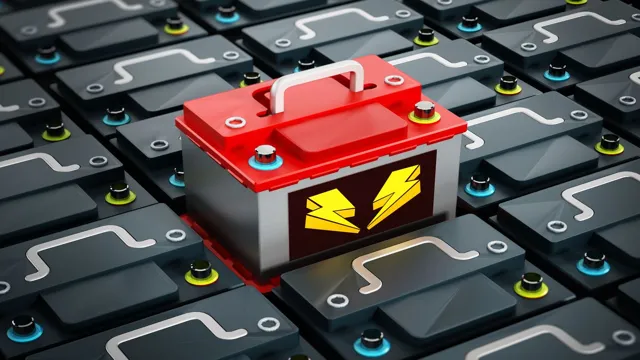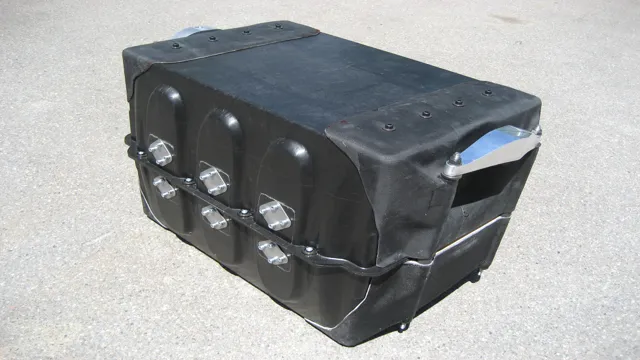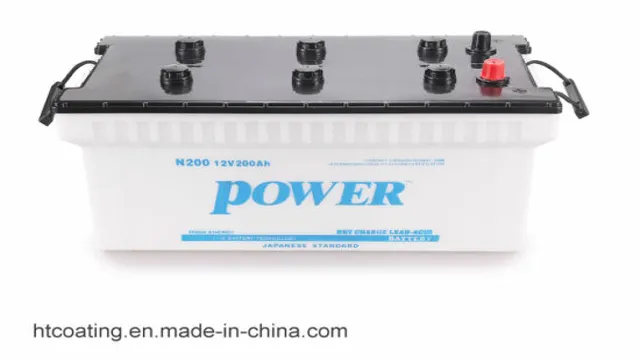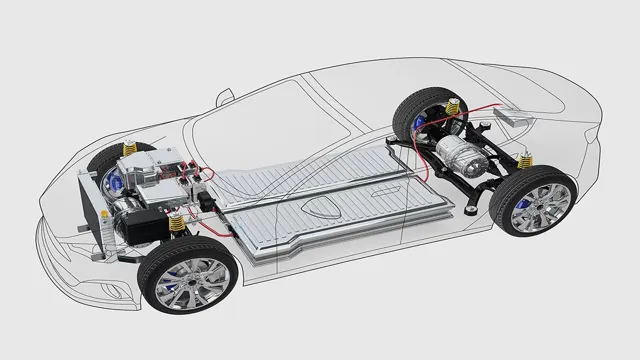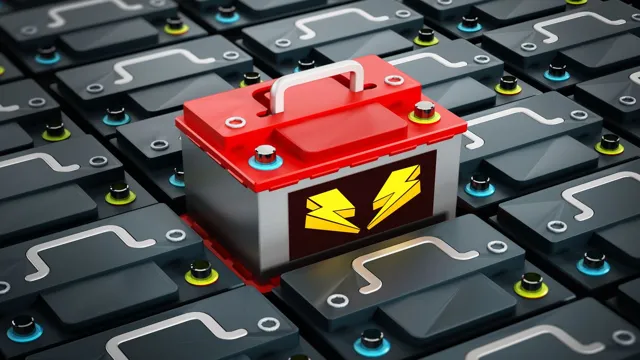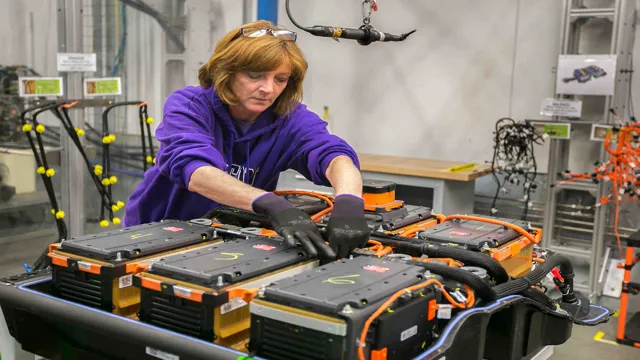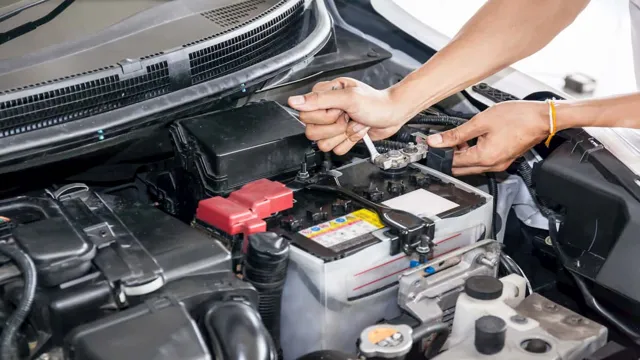Revolutionize Your Ride: The Ultimate Guide to Electric Car Battery Conversion
Electric cars have been rapidly growing in popularity lately, and for a good reason. They are practical, sustainable, and they positively contribute to environmental preservation. However, the hefty price tag that comes with purchasing an electric vehicle is barely sustainable for the average consumer.
Fortunately, there is a solution to this problem: converting traditional cars to run on electric car batteries. This trend has been gaining traction, and it’s becoming increasingly popular for many car owners who want to transform their traditional cars into eco-friendly powerhouses. With this innovative approach, you can save up on costs and still enjoy the benefits of an electric car without breaking the bank.
So how does electric car battery conversion work, and are there any downsides to this approach? Read on to find out.
Why Switch to Electric Car Batteries?
Are you tired of spending so much money on gas for your car? Maybe it’s time to consider converting to an electric car battery. Not only will this save you money in the long run, but it’s also much better for the environment. Electric cars produce zero emissions and have become increasingly affordable and accessible over the years.
While the initial cost of converting to an electric car battery may be high, the amount of money you’ll save on gas and maintenance will eventually make up for it in the long run. Plus, imagine never having to stop at a gas station again! Overall, switching to an electric car battery is a smart investment for both your wallet and the planet.
Cost Savings
As gasoline prices continue to rise and the effects of climate change become more apparent, electric cars are becoming increasingly popular. One big reason for this is the cost savings that come with switching to an electric car battery. Compared to gasoline-powered vehicles, electric cars are much cheaper to operate because they require less maintenance and use renewable energy sources.
Moreover, the cost of electricity is generally lower than the cost of gasoline, meaning that owners of electric cars save money on fuel costs in the long run. Additionally, electric cars are eligible for tax credits and incentives in some areas, which can further reduce the overall cost of ownership. By investing in an electric car battery today, you can save money while helping to reduce carbon emissions and protect the environment for generations to come.
So why not make the switch?
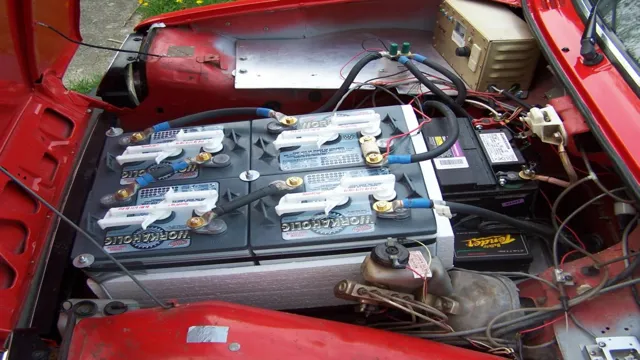
Eco-Friendly Transportation
Electric Car Batteries Electric cars are growing in popularity, both due to environmental concerns and the rising cost of fossil fuels. One of the main features of these vehicles is the electric car battery, which powers the car’s electric motor. Compared to traditional gas-powered vehicles, electric cars emit significantly less greenhouse gases and pollutants.
Additionally, electric car batteries have some advantages over traditional car batteries. For one, they don’t require any oil or other fluids, which means fewer fluids to check, change, and dispose of. They also have a longer lifespan and can be recharged quickly and easily.
However, electric car batteries aren’t perfect and still have some limitations when it comes to range and charging infrastructure. Despite this, more and more people are switching to electric cars for their daily commutes and errands, recognizing the benefits they provide for both the environment and their wallets.
Lower Maintenance Costs
Electric car batteries offer a significant advantage over traditional gasoline-powered vehicles in terms of lower maintenance costs. With fewer moving parts and a simpler design, electric cars require less servicing, and owners save a considerable amount of money on repairs and maintenance. Unlike traditional vehicles, electric cars do not rely on fluids such as oil or transmission fluid to function, which eliminates the need for regular oil changes and other routine maintenance tasks.
Electric car batteries also typically last longer and require fewer replacements than traditional car batteries, which can be a major cost-saving benefit over the lifetime of the vehicle. By switching to electric car batteries, drivers can enjoy the savings and convenience that come with fewer maintenance needs and more reliable performance, while also helping to reduce carbon emissions and the impact of transportation on the environment.
Options for Conversion
Thinking about converting your car to run on electric car batteries? There are a few different options to consider when it comes to this type of conversion. One option is a complete battery replacement, where the existing internal combustion engine is removed and replaced with an electric motor and battery system. Another option is a plug-in hybrid conversion, which involves adding an electric motor and battery to work in tandem with the existing engine.
Finally, there is the option of a retrofit conversion, which involves modifying the existing engine and drivetrain to run on both gasoline and electric power. Each option has its pros and cons, so be sure to do your research and choose the one that best fits your needs and budget. Regardless of which option you choose, converting your car to electric power can be a great way to reduce your environmental impact and save money on fuel costs.
Full-Scale Battery Replacement
If you’re considering a full-scale battery replacement, there are a few options to choose from. One option is to replace the battery with a new one of the same type and size. This might be the most straightforward option, but it may not solve all of your battery-related problems.
Another option is to switch to a different type of battery, such as a lithium-ion battery. Lithium-ion batteries are known for their high energy density, longer lifespan, and resistance to memory effect. However, lithium-ion batteries can be more expensive and require a different charging system.
On the other hand, you can also opt for a hybrid conversion kit, which combines a smaller lithium-ion battery with a conventional lead-acid battery. This allows you to enjoy the benefits of lithium-ion technology without completely replacing your battery system. Ultimately, the best option for your battery replacement will depend on your specific needs and budget.
Partial Replacement
When it comes to upgrading your home, you don’t always have to start from scratch. Partial replacement is a cost-effective option that allows you to make significant changes to your space without completely tearing everything apart. For example, if you want to revamp your kitchen, you could opt for partial replacement of the cabinets or countertops instead of a full renovation.
Similarly, if you’re looking to upgrade your bathroom, you could replace the bathtub or shower instead of redoing the entire space. The benefit of partial replacement is that it can save you a significant amount of money while still achieving your desired outcome. Plus, it’s often a quicker and less disruptive process than a full renovation.
So if you’re considering converting your home, don’t forget about the option of partial replacement. With the right planning and execution, it can transform your home without breaking the bank.
Swapping Services
Swapping services can be a great way to save money and get things done without breaking the bank. One option for conversion is to exchange skills or services with others in your community. For example, if you are a graphic designer, you might be able to trade your services with someone who is a website developer or a copywriter.
Alternatively, you could consider bartering goods or services that you have for things that you need. For instance, if you have a surplus of vegetables from your garden, you could trade them for a DIY project or even for someone to clean your house. Whatever method you choose, swapping services can be a win-win situation for everyone involved, as it allows you to get things done without spending a lot of money and helps others by sharing skills and resources.
Choosing the Right Battery
When it comes to converting a gas-powered car to an electric one, one of the most crucial decisions you’ll need to make is choosing the right electric car battery. Your choice of battery will impact the vehicle’s driving range, charging time, and overall performance. Lithium-ion batteries are the most common choice for electric car conversions due to their high energy density, low self-discharge rate, and long lifespan.
However, other battery types, such as lead-acid, nickel-cadmium, and nickel-metal hydride, may also be suitable depending on your specific needs and budget. It is important to consider factors such as cost, weight, size, and compatibility with the vehicle’s electrical system before making a decision. Consulting with a professional electric car conversion specialist can help you find the right battery that fits your unique budget, driving habits, and requirements.
Battery Capacity
When it comes to choosing the right battery, one of the most important factors to consider is battery capacity. Battery capacity, measured in milliampere-hours (mAh), indicates how much energy a battery can store and how long it will last before needing to be recharged. For example, a battery with a capacity of 3000mAh can deliver 3 amps of current for one hour, or 1 amp of current for three hours.
When choosing a battery, it’s important to consider how much power your device requires and how long you need the battery to last. If you’re using a high-drain device like a smartphone or tablet, you’ll want a battery with a higher capacity to ensure it doesn’t die in the middle of the day. It’s also important to note that a battery’s capacity will degrade over time, typically losing around 20% of its capacity after 300-500 charge cycles.
So, if you want your battery to last as long as possible, it’s important to choose a battery with a higher capacity than you think you’ll need and to replace it once it starts to show signs of reduced capacity.
Technology Considerations
When it comes to choosing the right battery for your technological needs, it’s important to consider factors such as battery life, performance, and compatibility with your device. A battery with a longer life will give you more time to work or play without having to constantly recharge, while a battery with higher performance will ensure your device runs smoothly without any interruptions or lag. You also want to make sure the battery you choose is compatible with your device to avoid any potential damage or malfunction.
In addition, it’s important to consider the environmental impact of the battery, as some types may be more harmful than others. Overall, taking the time to research and choose the right battery can make a big difference in your device’s performance and longevity.
Finding a Conversion Expert
Are you looking to convert your gas-guzzling car into an eco-friendly vehicle? One of the most significant changes you can make is to convert your car’s battery from gas to electric. While some may be tempted to do this on their own, it’s often best to seek the guidance of a conversion expert to ensure the process goes smoothly. Electric car batteries conversion can be a complex and challenging process that requires specialized knowledge and equipment.
A conversion specialist can help you choose the right battery, manage the electrical systems, and ensure that your vehicle operates smoothly and safely. Ultimately, hiring a conversion expert can save you time, money, and headaches while helping you do your part to protect the environment. So why not take the first step and find a conversion expert to help you get started on the road to an eco-friendly car today?
Research and Referrals
If you’re looking to find a conversion expert, there are a few key steps you should take. First, start by doing some research online. Look for experts in your industry who specialize in conversion rate optimization.
Read reviews and case studies to see if their methods have been successful for other businesses. Once you have a list of potential experts, reach out to your network for referrals. Ask colleagues, business partners, and even customers if they know of any experts they would recommend.
Referrals can be a great way to find a trustworthy and reliable expert who has a proven track record of success. Finally, don’t be afraid to schedule consultations with multiple experts to compare their approaches and determine which one is the best fit for your business. Remember, finding the right conversion expert can be a game changer for your business, so investing time and effort into the search is well worth it.
Expertise and Experience
When it comes to finding a conversion expert, it’s essential to look for someone who has both expertise and experience in the field. A conversion expert should have a deep understanding of the underlying principles and techniques necessary for driving conversions. This may include expertise in areas like user experience design, conversion rate optimization, and search engine optimization.
However, it’s not enough to have theoretical knowledge alone. A true expert will have practical experience in implementing solutions and driving measurable results. Look for conversion experts who have a proven track record of success with businesses similar to yours, and who can provide real-world examples of their work.
By finding someone with the right blend of expertise and experience, you can ensure that your conversion efforts will be focused, effective, and tailored to your specific needs.
Warranty and Support
When it comes to finding a conversion expert to help with your warranty and support needs, it’s important to do your research and find someone who is both knowledgeable and trustworthy. You want someone who not only understands the technical aspects of the conversion process, but also has a deep understanding of the industry and can provide you with the support and guidance you need throughout the warranty period. Look for someone who has experience working with a variety of different clients and who can provide you with references and testimonials from satisfied customers.
Don’t be afraid to ask questions and make sure you feel comfortable with the person you choose to work with. Remember, finding the right conversion expert can make all the difference in the success of your warranty and support efforts.
Conclusion
In conclusion, converting gas cars to electric with new batteries is not just a smart move for individual vehicle owners, but also for the planet as a whole. By ditching dirty fossil fuels and embracing cleaner energy sources, we can help reduce the damage done to our environment while enjoying the perks of a modern, high-tech driving experience. So if you’re thinking about ditching gas and going electric, go for it – you won’t regret making the switch to a cleaner, greener future!”
FAQs
What is an electric car battery conversion?
An electric car battery conversion is the process of replacing the conventional internal combustion engine (ICE) system of a vehicle with an electric motor and battery.
How much does an electric car battery conversion cost?
The cost of an electric car conversion varies depending on the make and model of the vehicle, the type of battery used, and the complexity of the conversion process. However, the average cost can range from $10,000 to as high as $50,000 or more.
Can any car be converted into an electric car?
While many traditional cars can be converted into electric cars, the feasibility of a conversion depends on factors such as the vehicle’s weight, powertrain, and available space for batteries. It’s best to consult an expert to determine if your car is suitable for conversion.
What are the benefits of electric car battery conversion?
Electric car battery conversion offers several benefits, including lower environmental impact due to fewer emissions, lower operating costs due to lower fuel costs and maintenance, and the ability to have a more sustainable lifestyle. Additionally, electric cars have a longer lifespan and are quieter to drive, providing a more comfortable driving experience.
